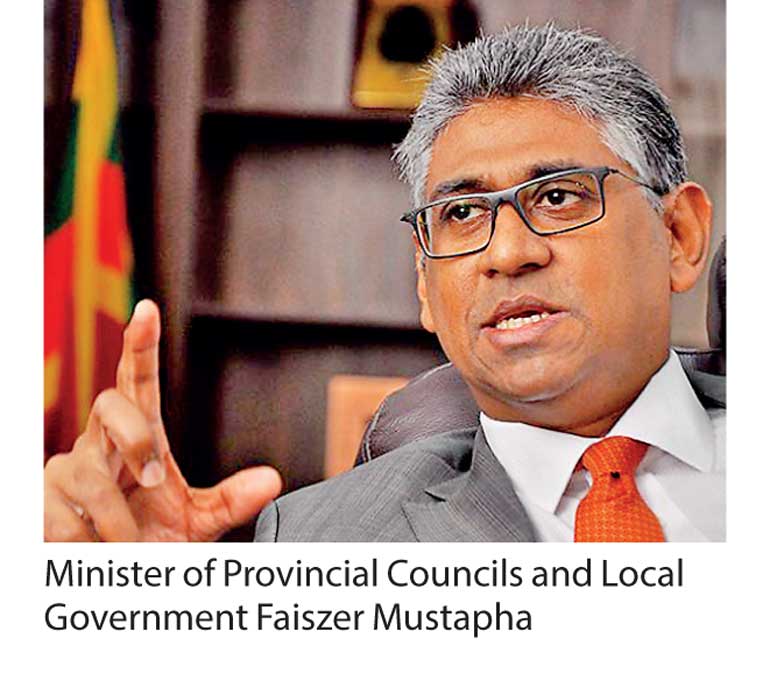Sunday Feb 22, 2026
Sunday Feb 22, 2026
Friday, 22 December 2017 00:00 - - {{hitsCtrl.values.hits}}

By Himal Kotelawala
A recent press conference held at the Ministry of Provincial Councils and Local Government to highlight development activities carried out by the Ministry predictably derailed to a back-and-forth between journalists and Minister Faiszer Musthapha on the long-delayed Local Government elections.
In a passionate albeit good humoured Q&A following the presentation, the Minister accused sections of the media of trying to portray a conflict between the Government and the Commissioner of Elections. He also declined to answer a question on the exact date of the polls (scheduled to be held sometime before 17 February next year), adding that it’s up to Elections Commissioner Mahinda Deshapriya to decide on a date.
Responding to questions by journalists who referred to comments reportedly made by Deshapriya on having to work within the powers his Commission is confined to, Musthapha said all matters pertaining to the upcoming polls had been sorted out.
“Gazettes have been issued. Our ball, bat and pitch are all adequate. There are no fingers pointed us at now. Everything needed for an election is ready. We have done our part.”
Assuring the media that he respects Commissioner Deshapriya, the Minister said he believed the former had carried out his task well.
The Elections Commission, he said, had traditionally coordinated with the Government when planning an election, and a governmental mechanism was needed for any election, as it was the Government that decided the allocation of teachers, setting dates for school exams and the like.
“Anybody can suggest a date for the election. The Commissioner is the one who decides,” said Musthapha.
“Don’t ask me about the date. Anyone is free to request an auspicious date for the polls if they wish to do so. There’s nothing wrong with that, in my opinion,” he added.
The Minister reiterated that the media need not create a conflict between the Commissioner and various Ministers of the Government.
“’[What you do is] take one voice cut from him, and another from us. I won’t fall for these tactics. You do your job as journalists; I’ll do mine as a Minister,” he said, in a lighter vein, imploring the journalists present to focus on the objective of the press conference: to highlight his Ministry’s development activities, which he said had been overshadowed by the LG poll scontroversy.
The Minister said corruption at local authorities had dropped over the past two-and-a-half years, along with wastage.
“Our Ministry has not allowed any corruption. We have minimised corruption in local bodies. Income has increased and expenses and wastage reduced in 90% of local governments,” he said, adding that the Ministry had the data to back up this claim.
“It’s easy to point fingers, but the data shows that local authorities have operated successfully,” he said.
Infrastructure and soft skills development projects rolled out in several provinces over the past three years, according to the Minister, earned his Ministry the number one ranking in utilising State funds, as decided by the Ministry of Finance and Planning.
The completed infrastructure projects include roads, water, sewage, sanitation, buildings, schools and parks across the island. Soft skills development and training of local Government authorities saw capacity building aimed at boosting planning capabilities of local authorities. The Ministry announced that this was with the goal of instilling an ability to take a proactive role in planning and encouraging ambition and leadership. Training was also given in the use of digital tools in everyday work.
Among the infrastructure measures implemented island wide so far, according to the Minister are a 1,378km upgrade of the road network, 813 new bridges, 141 market complexes and weekly fair centres, 38 children’s parks, 586 schools either constructed or renovated, 207 laboratories, 340 emergency treatment units (ETUs), and 1,812 maternal and child care clinics.
Other measures include waste water management and solid waste management, particularly in the Northern Province to minimise the impact of floods in 1,100 acres of paddy lands. The Ministry announced that the average annual household income in the area has increased from Rs. 85,413 to Rs. 203,661, with the increase of the extent of cultivated land up to 2,000 acres with effective production of paddy from 80 bushel to 100 bushel per acre, being the outcome.
“Locally-led developments have enormous potential to deliver the scale and quality of lifestyle growth among communities across Sri Lanka which is an absolute need. By providing basic facilities such as access to main roads, well-designed schools and public areas, mitigating the negative effects of flooding and natural disaster and supporting our local authorities, all enable better and enhanced lifestyles which contributes to a nation’s growth,” Minister Musthapha said.